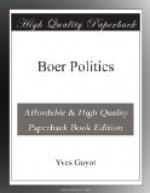PREFACE.
THE QUESTION.
I have endeavoured in the following pages to separate the Transvaal question from the many side issues by which it is obscured.
In the “Affaire Dreyfus” I constantly recurred to the main point—Dreyfus was condemned upon the “bordereau”; Dreyfus was not the author of the “bordereau,” therefore he was not responsible for the documents named in the “bordereau.”
In this case, in like manner, there is but one question:—Has or has not the government of the South African Republic acted up to the convention of 1884, and is the English government bound to regard that convention as of no effect with regard to the Uitlanders who have established themselves in the Transvaal on the faith that England would insist upon its being respected?
Pro-Boer Argument.
Pro-Boers refuse to recognise this point, as did M. Cavaignac when, in his speech of July 7th, 1898, he abandoned the “bordereau” to substitute for it the Henry forgery.
They keep talking of the Great Trek of 1836; of England’s greed; of the gold mines; and, above all, of the Jameson raid. The Jameson raid is their pet grievance; it takes the place of all argument. The Uitlanders may well say that “Jameson has been Krueger’s best friend.”
Notwithstanding, the Jameson raid is the best proof of the powerlessness of England to protect the interests of her subjects against the pretentions of the Pretoria Government.
In 1894, Lord Ripon had already made ineffectual representations to that Government concerning the contempt with which it was treating the Convention of 1884.
The Uitlanders had approached the Volksraad in a petition signed by 14,800 persons. The petitioners did not ask that the Republic should be placed under the control of the British Government; on the contrary, they postulated the maintenance of its independence; all that they asked was for “equitable administration and fair representation.” This petition was received with angry contempt. “Protest, protest as much as you like,” said Mr. Krueger, “I have arms, and you have none.”
It is contended that if President Krueger did provide himself to a formidable extent with munitions of war, it was not until after the Jameson Raid.
Here the connexion between cause and effect is not very clear; Jameson once beaten there was no further cause to arm against him. But from the Uitlanders’ petition, to which allusion has been made, it is evident that armaments had begun before. Among the alleged grievances we find the following:—
“A policy of force is openly declared against us; L250,000 have been expended on the construction of forts; upon one alone, designed to terrorise the inhabitants of Johannesburg, L100,000 has been spent. Large orders have been given to Krupp for big guns and maxims; and it is said that German Officers are coming to drill the burghers.”
The Uitlanders of Johannesburg treated with contumely, adopted the theories made use of by the Boers in their Petition of Rights of February 17th, 1881, by which they justified their insurrection against British rule, of December, 1880.




